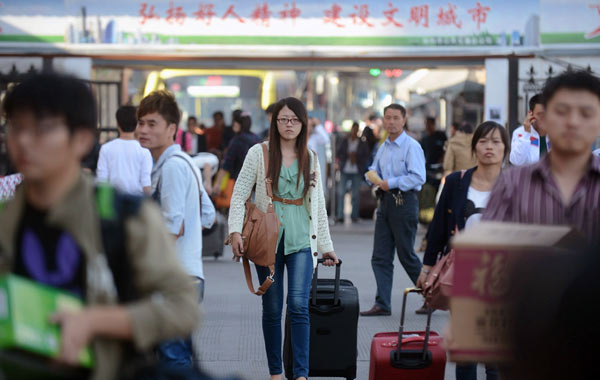Young Chinese couples struggle with seperation issues
Updated: 2012-11-04 09:43
By Liu Zhihua (China Daily)
|
||||||||
Deng Lizhen, 31, from Shenzhen, Guangdong province, is coping a lot better.
Her husband, Liu Weiwei, 29, recently made a move to Guangzhou, capital of Guangdong, because he was offered a new job.
They only meet up on weekends, either in Shenzhen or Guangzhou, about an hour's train ride both ways.
On weekdays, they are both too busy working to see each other.
 |
|
Commuting is part of the urban lifestyle, but couples do better to stay together than apart. [Photo by Meng Delong / for China Daily] |
Deng is a senior sales executive with the online dating company Century Love and her husband is an executive in the medical industry.
During the week, they keep in touch by sending online messages and they telephone each other before bedtime.
"It is the first time we have been apart in the last 10 years," Deng says, adding that they met in 2003, and got married in 2010. Their child is 6 months old.
The first week after Liu went to Guangzhou, Deng caught a severe cold, and she had to take care of herself. It was really depressing, she says.
"But we have to do this because we need the money."
Living in Shenzhen and raising a child is expensive, and they have just bought an apartment. Her husband's new job comes with a fat paycheck, which helps, although he will have to stay in Guangzhou for the next three years.
Deng believes that a minor separation may actually benefit the relationship, because they have been together for almost 10 years.
She says that one unexpected result of their temporary separation is that she is performing better at work, as she has thrown herself into her job.
The downside is that she misses her husband, especially when she hits a snag and needs to discuss her problems with him. She also worries about his health, because he is not used to taking care of himself.
"It is a price we must pay for better career development and our relationship," Deng says.
Experts say that the price may be higher than they think.
Married couples should stay together and being apart wreaks havoc, say the experts, who add that if issues are ignored they often get worse with time.
"I think the 'weekend couple' is against human nature," says Han Xueqing, director of the Clinical Psychology Department at Beijing Tongren Hospital.
Human beings are constantly in pursuit of security and safety most of their lives, he says, and spouses may feel insecure or feel that their marriage is threatened if they are apart most of the time.
In a society that is now morally wide open and full of pressure and temptations, constant separation will harm the chemistry between spouses. The old adage that absence makes the heart grow fonder is not always true, and being away from each other may slowly kill the intimacy of marriage, Han says.
"Marriage needs maintenance. It is very important for weekend couples to have effective communication and mutual trust."
Wu Can, 35, a marketing manager with a Fortune 500 international company in Shanghai, could not agree more. He knows it takes really hard work to keep a long distance relationship working.
His wife, Liu Tao, has been running her early education startup in Changshu city in Jiangsu province since 2008. Changshu is about 115 km from Shanghai, where he works.
Both are kept busy with work, so they talk on the phone for about an hour on workday evenings and enjoy some quality time during the weekends with their 2-year-old daughter.
They may take a stroll, shop or make a day trip to nearby attractions, or just stay at home and enjoy each other's company.
However, life was not like this at the beginning when they were still trying to find that elusive balance.
"We quarreled a lot over trifles from the beginning to about a year after we started living apart," says Wu. "I guess that was because we were vulnerable to the pressure of our jobs. We were missing each other, but we couldn't help venting our frustrations by picking on each other and becoming very demanding."
It took a lot of effort to overcome the hurdles. Wu says he is glad that he persisted in making constant phone calls and communicating with his wife, especially when she was facing difficulties with her job. He did this even after they quarreled.
"We trusted each other's loyalty and maturity completely, but it was still hard to cope with the distance, and to be able to talk to each other effectively at the beginning," Wu says.
"It was her dream to have her own business, so I did my best to make her feel I will always support that. It worked."
Wu and Liu now tell each other their dreams, share the funny things that happen at work, talk about their parents and families - all on the phone.
"We are both very independent people, and very rational. When one of us feels exhausted or disappointed, the other is there to support and give suggestions."
To a certain extent, their combined efforts to make the marriage work have borne fruit. In early 2010, their daughter was born. Liu's business is off the ground, and a new baby is on the way.
They plan to return to Shanghai as soon as Liu's employees can take care of the business.
Chao Jie, the young public relations boss in Shanghai, also plans to move back with her husband as soon as possible.
They are on the right path, says Han Xueqing. "Even when it is necessary to live apart for some reason, it should only be a temporary arrangement. A couple should live together."
Contact the writer at liuzhihua@chinadaily.com.cn.











